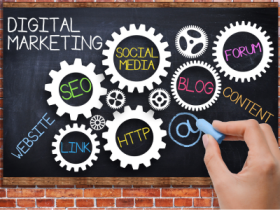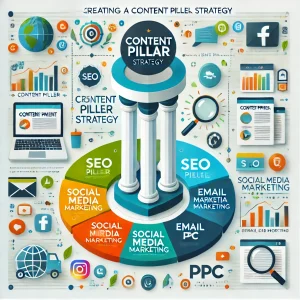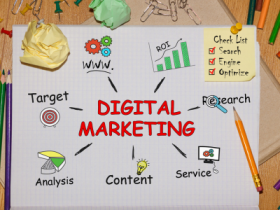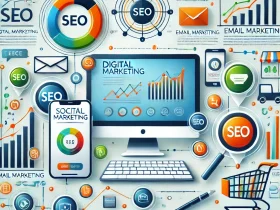Introduction
In today’s fast-paced business landscape, digital marketing has become a critical component for companies aiming to stay competitive and effectively reach their target audience. The rise of the internet, social media, and digital technologies has fundamentally changed how businesses engage with consumers, making traditional marketing methods less effective in many cases. In this article, we’ll explore why digital marketing is crucial in the modern business environment.
1. Wider Reach and Global Exposure
Digital marketing enables businesses to reach a global audience at a fraction of the cost of traditional marketing methods. Through various channels such as websites, social media, and email marketing, companies can target consumers worldwide, expanding their market presence far beyond local or regional limits.
2. Cost-Effectiveness
Compared to traditional marketing, digital marketing is often more affordable. Small businesses, startups, and even large enterprises can leverage digital marketing platforms like social media, Google Ads, or content marketing to promote their products or services within a budget. It allows for better allocation of resources and greater control over spending.
3. Targeted Marketing and Personalization
With the help of data analytics, digital marketing allows businesses to segment their audience based on demographics, behavior, location, and interests. This enables personalized marketing campaigns that resonate more with the consumer. For example, a brand can tailor its email campaigns or social media ads to match specific consumer preferences, leading to higher engagement and conversions.
Benefits of Targeted Marketing
| Benefit | Traditional Marketing | Digital Marketing |
|---|---|---|
| Reach | Limited to local or regional areas. | Global reach, with the ability to target specific audiences. |
| Cost | Often high, especially for TV and print ads. | More affordable, with flexible options for all budgets. |
| Personalization | Limited, based on broader segments. | Highly personalized based on customer data. |
4. Real-Time Performance Tracking
One of the greatest advantages of digital marketing is the ability to measure and track performance in real time. Tools like Google Analytics, social media insights, and email marketing platforms provide immediate feedback on campaign performance, allowing businesses to make data-driven adjustments and optimize their efforts instantly.
5. Enhanced Customer Engagement
Digital marketing allows businesses to communicate directly with their customers through interactive platforms like social media, blogs, and websites. Brands can engage with their audience by responding to inquiries, addressing feedback, and building a community around their products or services. This level of engagement fosters loyalty and strengthens customer relationships.
Examples of Engagement Channels
| Engagement Channel | Traditional Marketing | Digital Marketing |
|---|---|---|
| Communication Style | One-way communication (business to consumer). | Two-way communication with direct consumer interaction. |
| Engagement Tools | Limited to face-to-face, phone calls, or print. | Social media, comments, live chats, and email marketing. |
6. Improved Brand Visibility
By utilizing search engine optimization (SEO) techniques, social media marketing, and online advertising, businesses can enhance their online presence and improve brand visibility. A well-executed digital marketing strategy ensures that your brand appears in front of potential customers when they search for relevant products or services.
7. Access to Multiple Marketing Channels
Digital marketing includes a variety of channels such as social media, email marketing, content marketing, search engine optimization (SEO), pay-per-click (PPC) ads, affiliate marketing, and more. The flexibility to choose and combine these channels based on the audience and goals ensures a comprehensive marketing approach that can be customized to specific needs.
| Marketing Channel | Traditional Marketing | Digital Marketing |
|---|---|---|
| Methods | TV, radio, print ads, direct mail. | SEO, PPC, social media, email campaigns. |
| Interactivity | Limited interaction with the audience. | Real-time interaction and feedback from customers. |
8. Competitive Advantage
With the increasing reliance on the internet, businesses that are not leveraging digital marketing risk falling behind competitors who are actively engaging with their customers online. In today’s marketplace, a strong digital presence is crucial for attracting and retaining customers, making digital marketing a vital tool for gaining a competitive edge.
9. Better ROI
Because digital marketing is cost-effective and measurable, it often provides better returns on investment (ROI) than traditional marketing methods. With the ability to track and measure the success of campaigns in real-time, businesses can optimize their strategies and allocate budgets to the most effective channels, maximizing their ROI.
10. Adapting to Consumer Behavior
Today’s consumers are increasingly online, using smartphones, social media, and search engines to discover products and make purchasing decisions. Digital marketing enables businesses to adapt to these shifts in consumer behavior by providing content and experiences that align with how and where consumers make their purchasing decisions.
Conclusion
In today’s business environment, digital marketing is no longer optional but essential for success. It provides businesses with the tools to reach a wider audience, optimize marketing efforts, engage with customers, and ultimately drive growth. The dynamic and measurable nature of digital marketing makes it a powerful tool in shaping how businesses interact with their audience, making it a cornerstone of modern marketing strategies.






Leave a Reply